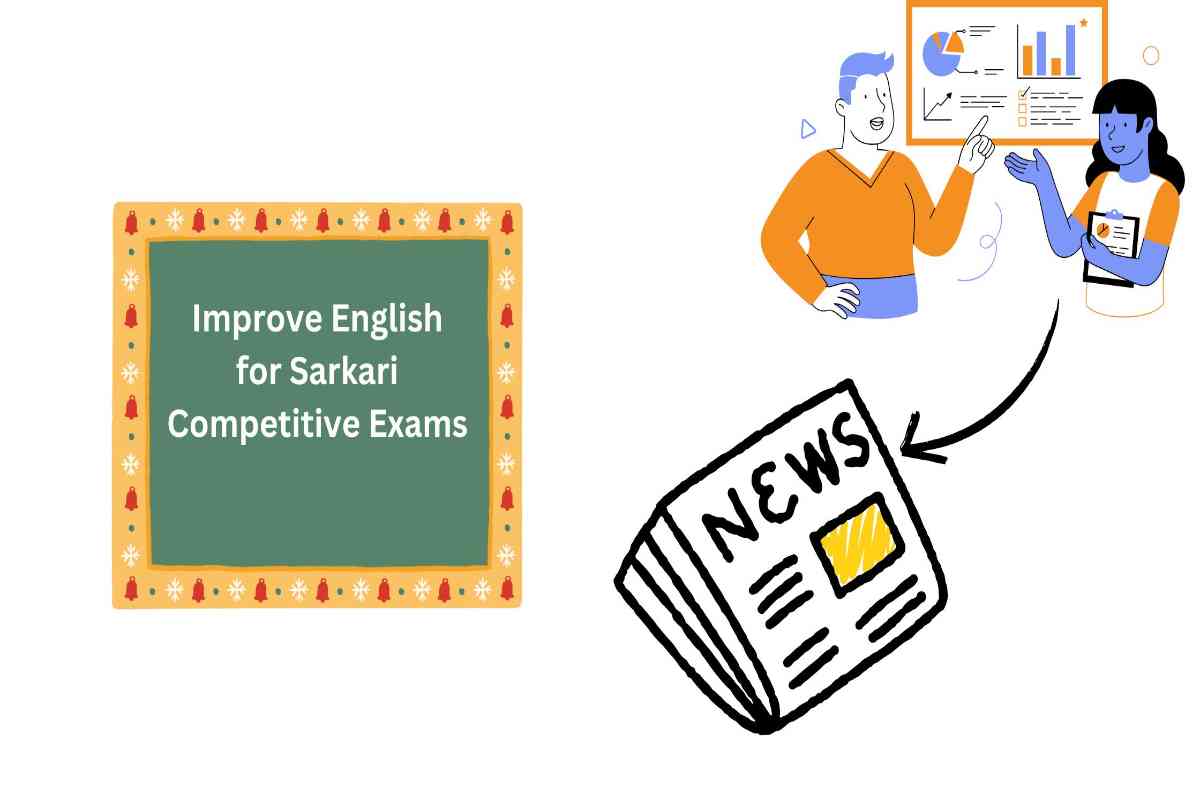Let’s face it—English in Sarkari exams is like that one strict teacher from school. You know it’s important, but it still gives you anxiety. Whether you’re preparing for SSC, Banking, Railways, or UPSC, English can be a game-changer, if not the deal-breaker. so improve english for sarkari competitive exams is very important.
So, if you’ve ever stared at an error detection question thinking, “Yeh kya chamatkar hai?”, don’t worry—you’re not alone.
In this blog, we’ll share practical tips to improve English for Sarkari competitive exams, along with examples, internal resources, and a few laughs (because studying without humor is just punishment with a pen).
Why English Matters in Competitive Exams
English is a core subject in almost all major government exams:
- SSC CGL, CHSL, MTS
- IBPS PO, SBI Clerk
- UPSC Prelims & CSAT
- Railways NTPC & Group D
- It usually includes:
- Grammar
- Vocabulary
- Comprehension
- Cloze Tests
- Error Spotting
- Para Jumbles
Funny Truth: You don’t need Shakespeare-level English. But you also can’t write “he go to school everyday” and expect to clear SSC CGL. 😅
8 Tips to Improve English for Sarkari Competitive Exams
1. Start with the Basics of Grammar
Begin with Wren & Martin’s High School Grammar or S.P. Bakshi’s Objective General English.
Understand parts of speech, tenses, subject-verb agreement, and modifiers.
👉 Explore: Best Books for Government Exam
Example: “The boy, along with his friends, is/are playing.”
Answer: is playing (because “the boy” is the subject, not his friends)
2. Build Your Vocabulary Daily
Use apps like Vocabulary.com or read books like Word Power Made Easy by Norman Lewis.
Learn 5–10 new words every day with their meanings, synonyms, and usage.
Funny Hack: Want to impress your crush and the UPSC panel? Learn words like “perspicacious” and “quintessential” (but only use them where needed 😁).
3. Read English Newspapers & Editorials
Try The Hindu, Indian Express, or LiveMint. Focus on:
- Editorials (for comprehension + opinion building)
- Headlines (for summaries)
- Vocabulary in context
Highlight new words and write them down with usage.
👉 Useful for: Preparation for Government Job
4. Practice Reading Comprehension (RC) Daily
Use practice sets from previous year papers or books like Plinth to Paramount.
Start with small RCs and move to bigger ones. Focus on:
- Speed + understanding
- Main idea & tone
- Inference-based questions
Real Aspirant Tip: Rahul (SSC CHSL 2022) read editorials for 20 mins every day and improved both comprehension and opinion formation skills.
5. Solve Grammar-Based MCQs Regularly
Practice from trusted books:
- S.P. Bakshi (Arihant)
- Kiran’s SSC English Chapterwise
- Mirror of Common Errors by Dr. Ashok Kumar
Create error-notes from your mistakes and revise weekly.
6. Watch English Content with Subtitles
No, you don’t have to binge BBC documentaries (unless you want to). Start with:
- English news channels (NDTV, CNN)
- Light sitcoms like Friends or The Office
- YouTube grammar channels (English with Lucy, Unacademy)
This improves listening, tone, and contextual vocabulary.
7. Write to Improve Fluency
Write short paragraphs daily:
- Summarize the news in your words
- Maintain an English diary
- Write mock essays/letters (important for SSC, Descriptive exams)
Funny Line: Write as if your English teacher is going to check it—and deduct 5 marks for every ‘btw’ and ‘u’ instead of ‘you’. 😂
8. Revise Smartly, Not Repeatedly
Don’t just cram grammar rules. Revise smartly using:
- Flashcards
- Weekly vocab tests
- 10-minute quizzes
- One-page summaries
Create a personal “English Toolkit” notebook for formulas, rules, exceptions, and your common errors.
📌 Combine English with a Strong Study Plan
Mastering English is a long-term game. Combine these tips with your Gov job taiyari strategy. Use a consistent Daily Study Routine for Gov Job that includes 1-1.5 hours of English practice.
🧠 Final Thoughts
Improving English for Sarkari competitive exams is totally doable, even if you’re from a Hindi-medium background. What matters is regular exposure, smart practice, and the right attitude.
English is not a subject to fear—it’s a subject to master.
Start small. Be consistent. And who knows? One day you might start correcting your friends’ grammar in WhatsApp groups (with pride, not guilt 😎).
